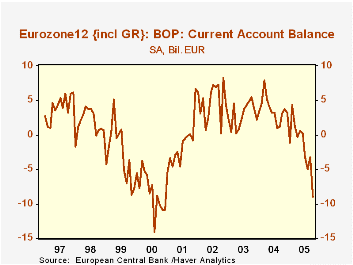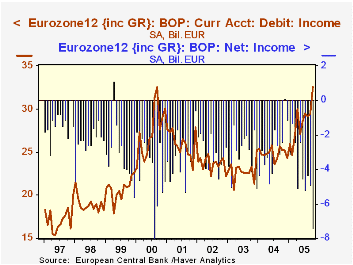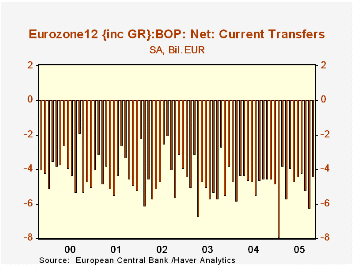 Global| Dec 23 2005
Global| Dec 23 2005EU Current Account Deficit Widens in October; Investment Income Contributes as Well as Goods Imports
Summary
The European Central Bank today reported that the Euro-Zone12 countries had an aggregate current account deficit of 9 billion in October, the largest monthly deficit since December 2000. Adverse movements in both credit and debit [...]

The European Central Bank today reported that the Euro-Zone12 countries had an aggregate current account deficit of €9 billion in October, the largest monthly deficit since December 2000. Adverse movements in both credit and debit flows were responsible for the sizable deterioration from -€3.3 billion in September and a surplus of €3.1 billion in the year-earlier month. (All data here are seasonally adjusted.)
In the month, goods exports fell €2.8 billion, so token increases in credit flows in other parts of the current account were not able to offset completely that decline and total credits to the current account eased by €1.0 billion. Debit items, however, rose once again, this month by €4.8 billion, with a total increase of €22.6 billion in the last year. It's easy to say, oh well, higher priced petroleum must have done that. It was important, but total goods imports accounted for only about 60% of the deterioration. Outflows of investment income were the other major negative, increasing €3.2 billion from September to €32.6 billion, tied for a record high with September 2000. Growth in foreign investments into the Euro-Zone countries over the last five years, particularly for portfolio investment, have apparently generated the rising outflow of interest and dividends. All together, the balance on goods, usually in comfortable surplus for the Euro-Zone as a whole, diminished to just barely positive in October, €300 million. Net investment income was -€7.4 billion, the second largest such shortfall since these accounts began in 1997; only August 2000 was larger, with €8.0 billion.
One bittersweet note on these data at this holiday season. Net current transfers in October were -€4.4 billion, less negative than September's €6.2 billion and similar to their recent range between €4 and €5 billion. However, in January 2005, this balance was -€7.9 billion, by far the largest ever, with €14.8 billion in debit outflows, also considerably larger than any other month. We'd surmise that at least some of the extra funds in that month represented European governments' and residents' contributions to Asian tsunami relief, widely recognized as an extraordinary disaster fund-raising effort. See the third graph for an illustration.
| Euro-Zone12Bil.€, Seasonally Adjusted | Oct 2005 | Sept 2005 | Oct 2004 | Monthly Averages|||
|---|---|---|---|---|---|---|
| 2004 | 2003 | 2002 | ||||
| Current Account Balance | -9.0 | -3.3 | 3.1 | 3.6 | 2.9 | 4.9 |
| Credit | 166.8 | 167.8 | 156.3 | 152.5 | 141.2 | 144.0 |
| Debit | 175.8 | 171.1 | 153.2 | 148.8 | 138.3 | 139.2 |
| Goods Balance | 0.3 | 5.3 | 6.6 | 8.8 | 9.1 | 10.9 |
| Services Balance | 2.5 | 2.5 | 3.4 | 2.4 | 1.6 | 1.1 |
| Income Balance | -7.4 | -4.9 | -2.4 | -2.8 | -3.1 | -3.1 |
| Net Transfers | -4.4 | -6.2 | -4.5 | -4.7 | -4.8 | -4.1 |
Carol Stone, CBE
AuthorMore in Author Profile »Carol Stone, CBE came to Haver Analytics in 2003 following more than 35 years as a financial market economist at major Wall Street financial institutions, most especially Merrill Lynch and Nomura Securities. She had broad experience in analysis and forecasting of flow-of-funds accounts, the federal budget and Federal Reserve operations. At Nomura Securities, among other duties, she developed various indicator forecasting tools and edited a daily global publication produced in London and New York for readers in Tokyo. At Haver Analytics, Carol was a member of the Research Department, aiding database managers with research and documentation efforts, as well as posting commentary on select economic reports. In addition, she conducted Ways-of-the-World, a blog on economic issues for an Episcopal-Church-affiliated website, The Geranium Farm. During her career, Carol served as an officer of the Money Marketeers and the Downtown Economists Club. She had a PhD from NYU's Stern School of Business. She lived in Brooklyn, New York, and had a weekend home on Long Island.
More Economy in Brief
 Global| Feb 05 2026
Global| Feb 05 2026Charts of the Week: Balanced Policy, Resilient Data and AI Narratives
by:Andrew Cates





